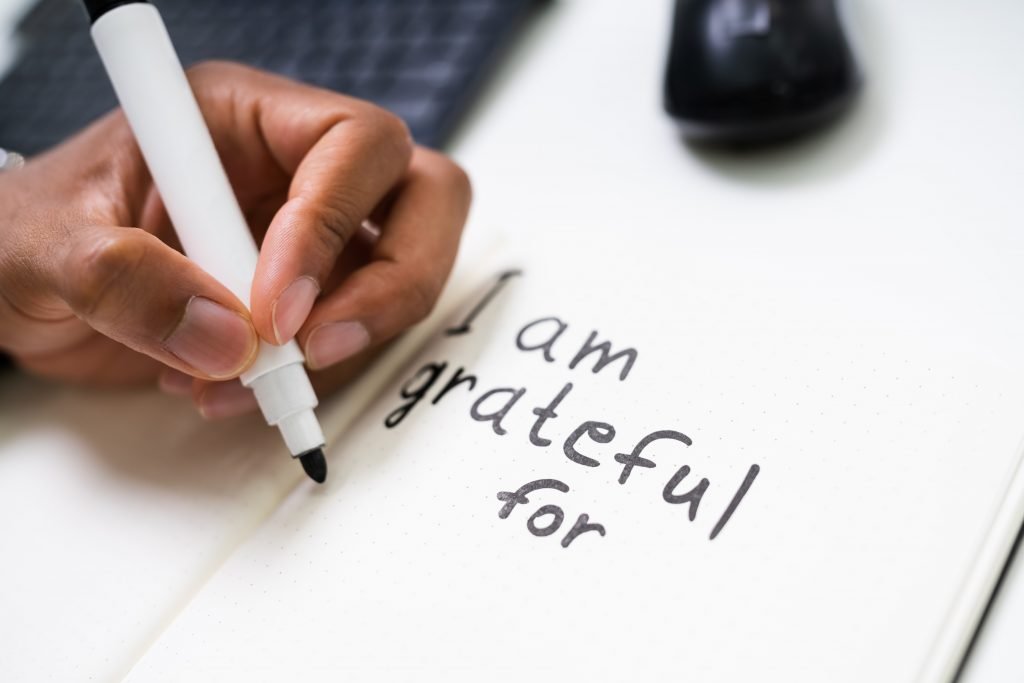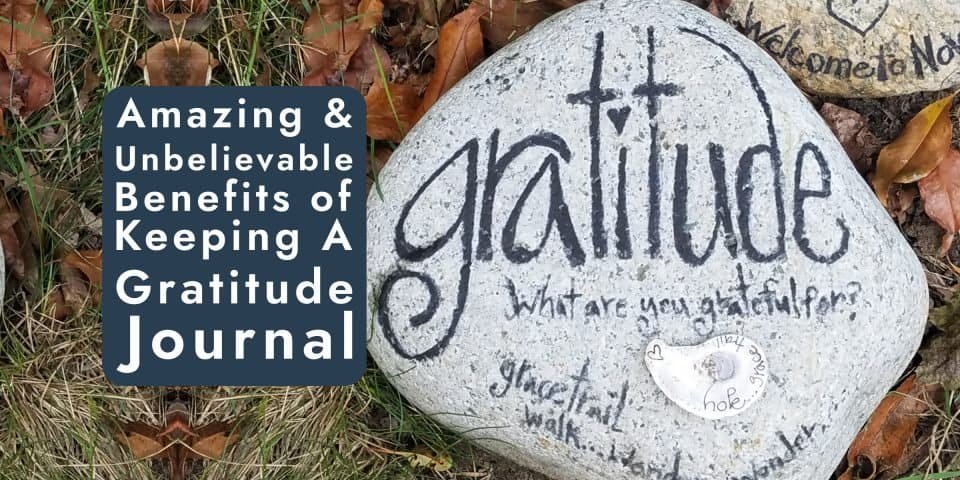The Benefits of Keeping a Gratitude Journal
Do you have a gratitude journal? If not, allow me to make a case for starting this amazing habit. If yes, allow me to make a case for making it more deliberate.
Everyone has bad days, weeks, or even months. The question is whether or not you’re able to get back up on your feet. Gratitude journals are a wonderful way for us to take note of the positive experiences that occur in our lives. This simple act makes us more resilient when things go wrong.
Writing in a gratitude journal is a simple and private way to explore what makes you happy or feel grateful. You can write about pretty much anything and everything you can think of. From doing well at work, receiving an unexpected gift, or sharing with friends and family.
Finding happiness in life no matter the situation is very important in maintaining a high level of happiness. Gratitude can play a significant role in accomplishing this. Despite the challenges you face, you have reasons to be grateful for many things, including lessons learned, failures, successes, you name it. Gratitude is something we can all achieve and there is no harm in taking a little time to count your blessings.
Sometimes you may have to dig a little deep to find the reasons for being grateful, but it’s worth the effort. Having a grateful attitude will help us not only be resilient, but it also helps us consider other people’s needs and situations. In addition, having a grateful attitude will make you feel better and help you appreciate all the things that are going right in your life.
You may find yourself feeling more positive and productive in life after practicing gratitude regularly. A gratitude journal not only offers great benefits associated with journaling, but makes it easier to incorporate gratitude into your daily routine.
Why You Should Keep a Gratitude Journal
It takes practice to get into the habit of appreciating the small wins in your day. Keeping a gratitude journal encourages you to write down and reflect on the things that you feel thankful for. Keeping an ongoing record of your life’s gratitude helps you notice things you might otherwise overlook.
e journal is also easy to maintain. It only requires a few minutes each day, so it can easily fit into even the busiest schedule. The process can be as simple as writing down one to five things that you’re grateful for each day. If you have more time, you can take time to reflect on each item that you are grateful for, list more items that you are thankful for the day or go back and review past journal days.

Proven Benefits of Keeping a Gratitude Journal
Wondering what benefits may come from keeping a gratitude journal? If you’re a left minded type, you might appreciate the “The Science of Gratitude,” white paper prepared by UC Berkeley’s Greater Good Science Center for the John Templeton Foundation (published in May 2018). This project reviewed various studies related to the roots of gratitude, benefits of gratitude and how to incorporate gratitude in our daily lives. Several powerful quotes from this research that highlight individual and social benefits of gratitude are listed below. I found them inspirational and motivating, what are your thoughts on them?
1) Increased happiness and positive thinking. “A handful of studies suggest that more grateful people may be healthier, and others suggest that scientifically designed practices to increase gratitude can also improve people’s health and encourage them to adopt healthier habits.
Many more studies have examined possible connections between gratitude and various elements of psychological well-being. In general, more grateful people are happier, more satisfied with their lives, less materialistic, and less likely to suffer from burnout. Additionally, some studies have found that gratitude practices, like keeping a “gratitude journal” or writing a letter of gratitude, can increase people’s happiness and overall positive mood.”
2) Better physical and psychological health. “Gratitude may also benefit people with various medical and psychological challenges. For example, one study found that more grateful cardiac patients reported better sleep, less fatigue, and lower levels of cellular inflammation, and another found that heart failure patients who kept a gratitude journal for eight weeks were more grateful and had reduced signs of inflammation afterwards. Several studies have found that more grateful people experience less depression and are more resilient following traumatic event.”
3) Increased interest in school and social integration for children and adolescents. “In recent years, studies have examined gratitude’s potential benefits for children and adolescents. For example, studies have found that more grateful adolescents are more interested and satisfied with their school lives, are more kind and helpful, and are more socially integrated.”
4) Strengthened Relationships. “Research supports what some researchers refer to as the “find, remind, and bind” function of gratitude: By attuning people to the thoughtfulness of others, gratitude helps them “find” or identify people who are good candidates for quality future relationships; it also helps “remind” people of the goodness of their existing relationships; and it “binds” them to their partners and friends by making them feel appreciated and encouraging them to engage in behaviors that will help prolong their relationships. For example, one study found that participants who were thanked for helping a student on an assignment were more interested in affiliating with that student in the future; another study found that partners who had a series of conversations expressing gratitude to their partner reported more improvements in their personal well-being and in the well-being of their relationship than did partners who had conversations disclosing something personal about themselves.”
A grateful heart is a magnet for miracles.
How to Keep a Gratitude Journal
The first step in keeping a gratitude journal is to find a place to record your thoughts. Some people like to use old notebooks from school, some use loose-leaf sheets, and others find having a cute notebook dedicated to journaling to be the right choice. Whatever the medium you choose, just be sure that it’s something you ‘ll enjoy writing in on a regular basis.
Next, develop a routine for journaling. You may decide to write every night before bed, or at the end of each day. Consistency is the key. Whatever you do, make sure you can consistently carve out a few minutes daily for taking note of things you feel grateful for.
Finally, start writing. This step is simple, but it can be hard if you don’t know where to start. The main thing is to just write something down. You can start off with something simple like, I’m grateful I woke up today. Or you can start with something more personal like, I’m grateful for the love and support of my friends and family. Just get your thoughts on paper, and that will encourage you to keep going.
Here are 5 Stater Ideas to Help You Begin Your Gratitude Journal
- I’m grateful that I woke up today.
- I’m grateful for the ability to see and hear.
- I’m grateful for my friends and family.
- I’m grateful that I have a roof over my head
- I’m grateful for a good night’s sleep.
There you have it! Five simple ideas to help you get started writing in your gratitude journal.
A gratitude journal doesn’t need to be anything fancy or expensive. A simple notebook or diary will work just fine.

Not Into Journaling?
What if you don’t like writing? That’s fine. Skip the writing and speak to yourself out loud. In a confident and firm voice, say aloud the things you are thankful for. Enjoy all of the things you know to be true and good. Use your voice to remind yourself of the beauty and wonder of the world. Verbalize what you’re experiencing now, what you’re learning now. This will help you to be present in the moment so you don’t miss the opportunities that are here now.
Just as with a writing journal, it’s important to have a designated time and place in which to speak aloud your gratitude. If you want to take it a step further, record your voice and listen back later. Hearing your own words will help to build your confidence and faith in yourself.
Once you’ve got the feel for this exercise, try doing it in front of a mirror. There’s something powerful about seeing yourself express gratitude out loud that can help move your words to action.
Each One Teach One
Have children or young adults in your life? Help them get into the practice of being grateful on a daily basis. With young kids, you can share what you are grateful for and encourage them to do the same. I started this practice with my girls many months ago and I am grateful for how far along they have come with the practice. Hearing what they are grateful for not only gives me better insight about what they prioritize and what is meaningful to them. I know for a fact that my youngest is grateful for our dog. “I am grateful for Maya” is the first thing that comes from her mouth each evening when the question comes up.
A Final Thought
Gratitude helps you think about what you have, rather than what you want. It makes you more aware of opportunity, and less likely to take yourself for granted. Gratitude is not just a feeling; it’s also a choice. You can choose to be grateful even when your life is difficult, or when people are unkind. It is an act of defiance, an act of strength to move through the negative thoughts and experiences and to acknowledge what worked well that day. Happy journaling.





